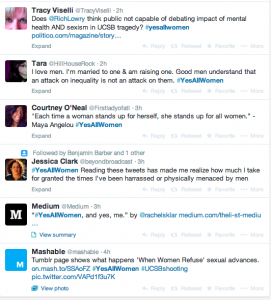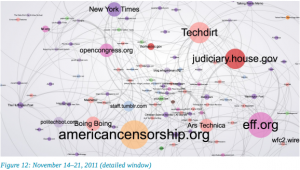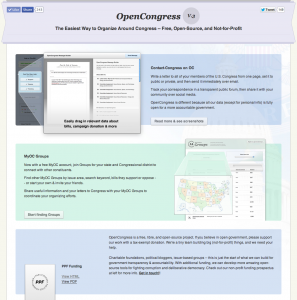This past week, like many others, I’ve been transfixed and energized by the #YesAllWomen campaign. Background from Amanda Hess and Jessica Valenti and others. I’ve spent the week listening to and learning from intense personal stories from friends & colleagues – about routine sexual harassment, double legal standards, subtle damaging cultural norms and more. The recent tie-ins with terrible violence, mental health availability, and regulations on automatic weapons only amplifies the emotion.
 But as is widely recognized, all the page views and RT’s and likes from #YesAllWomen posts take place largely within the silos of social media services. Yes they absolutely raise consciousness, raise serious issues. Yes they’re an important and urgent political expression – at PPF, after all, we believe that lightweight steps towards everyday political engagement is necessary and valuable. We’re not anti-hashtag campaigns as part of the landscape, and in any case, who could possibly be in a position to make such judgements? We’re bullish on social media activism; it’s important and personal, and it can serve as a necessary if not sufficient condition to create structural social change. The real danger, though, is that all the #YesAllWomen actions float out there in the ether, gated behind Facebook, and don’t have the impact they could have going forward, and people aren’t connected to the organizers & resources that could make a difference.
But as is widely recognized, all the page views and RT’s and likes from #YesAllWomen posts take place largely within the silos of social media services. Yes they absolutely raise consciousness, raise serious issues. Yes they’re an important and urgent political expression – at PPF, after all, we believe that lightweight steps towards everyday political engagement is necessary and valuable. We’re not anti-hashtag campaigns as part of the landscape, and in any case, who could possibly be in a position to make such judgements? We’re bullish on social media activism; it’s important and personal, and it can serve as a necessary if not sufficient condition to create structural social change. The real danger, though, is that all the #YesAllWomen actions float out there in the ether, gated behind Facebook, and don’t have the impact they could have going forward, and people aren’t connected to the organizers & resources that could make a difference.
But what’s less widely recognized, I believe, is that this moving groundswell of solidarity & testimonial can be channeled into the legislative process at every level of government. One of the missing components – again, necessary but not sufficient – is open data standards for constituent communications. We can connect an individual #YesAllWomen hashtag on Facebook or Twitter to a Congressional district and the actual legislative process. The gender equity policy recommendations gathered by a reputable think tank – such as Center for American Progress or others – can be supported, evangelized, and promoted by hashtag campaigns on social media. Consciousness can connect with policy reforms and empirically-reformed regulations for renewed levels of public accountability.
With more support for open data standards for constituent communications, the following is possible – breaking out of the solitary model of writing-your-reps into a networked public sphere:
- A person posts a note with #YesAllWomen hashtag on social media, such as in a Facebook or Twitter update, and possibly with an accompanying URL to verify her support of a campaign or initiative (as opposed to just hopping on a hashtag for discussion or info-sharing purposes).
- A non-profit service or accountable coop organization catches that hashtag and authenticates that person as a constituent in her specific Congressional district, locating her elected officials – such as her U.S. representative.
- A non-profit service communicates that update to her elected officials in the U.S. Congress, state government and city government, as structured data in an open XML format. (We have the specs and are ready to build!)
- Elected officials’ offices route the communication into their proprietary CMS, acknowledging this communication from the constituent and assigning it for a response in a public ticket queue (or private, in some cases). This would create, for the first time, an open CRM & CMS for Congress and other government offices, in place of the current dysfunctional system of weird webforms and closed-off emails.
- Government staff have new access to dynamic, data-rich dashboards for opinions and feelings of their constituents – crucially, that integrate with their official CRM & CMS solutions, so a bigger-picture is generated, gathering more public feedback & specific expertise.
- An advocacy organization for womens’ rights can query the non-profit service to find more supporters of their policy reforms in all 50 states & 435 Congressional districts & major metropolitan areas, then organize their supporters to convey more pressure to their U.S. reps. Local organizers can begin building knowledge and motivating more layered campaigns and in-district meetings.
- The ideal (but not utopian) outcome is that a junior U.S. rep, who previously deferred to committee & party leadership in what’s possible in his committee, hears from his constituents that gender equity is a pressing priority, and instructs his legislative staff to get moving on ways to advance a reform bill.
- The distributed swirl of feelings and news and personal stories on Facebook has an open-data hook into the legislative process, for public accountability and a more-liquid representative democracy, increasing trust and engagement in the political process. (In some cases, such as net neutrality, mitigating the corrupting influence of campaign contributions and lobbyists.)
- The individual person’s statement of solidarity with #YesAllWomen receives a note of acknowledgement from federal, state, and municipal elected officials, with policy responses and opportunities for follow-up engagement.
- In true networked public sphere style, advocacy and community groups and media watchdogs can provide updates to the action-taker about the issues she’s following and on #YesAllWomen-related reform legislation’s progress in relevant committees. Closing the loop on engagement.
Why doesn’t an open dashboard of constituent priorities exist for your elected officials at every level of government? Why isn’t it public-facing and fun to use? Why can’t you directly and easily email your support of #YesAllWomen to the legislative staff of your U.S. rep? Why have offices of the U.S. Congress hidden behind individual webforms for so long (almost two decades) and refused to accept messages in bulk structured open data? Why do elected officials’ offices use closed, commercial services for getting “feedback” from their constituents when it’s possible for the public to actually raise and advance their own public policy priorities?
Why can’t you easily find other #YesAllWomen supporters in your Congressional district, if you’re not already friends with them on Facebook? Why isn’t issue advocacy more social and networked? Why isn’t it easier to identify the hurdles and roadblocks to enacting legislative reform? Why isn’t there a reliable public schedule of hearings on pressing issues, for advocacy groups to more effectively influence the process and contribute expertise? Why isn’t policy data & public opinion on issues more inter-operable between jurisdictions of government: federal, state, county & municipal?
Our non-profit and our open-government allies have the technical specs to make possible the above integration of social media actions with structured digital communications to Congress. PPF raised these issues directly in 2010, when we first began open-source development on our Contact-Congress project on our flagship engagement site, OpenCongress.
Congressional offices should have to be accountable to open, public-facing dashboards that show their constituents’ priorities, and when they schedule meetings with corporate lobbyists to also schedule with public-benefit groups. So much lawmaking oxygen has been depleted or squandered over the past several Congresses – for example, up to 54 votes on repealing Obamacare in the U.S. House, but how many on anti-harassment reforms?
Four years later, we could have robust open data standards for raising issues and policy suggestions and questions to Congress, and a vanguard of offices that accept the XML format over email and respond to constituents publicly. We could quanitfy how many people in, say, the VA-06 Congressional District have posted #YesAllWomen on Facebook, or supported enhanced firearms regulations on Twitter. We’ve simply never had the funding support to develop open data standards for communicating ideas to people in power. Some #opengov organizations focus on transparency, and others on engagement in communities, but very few support core open-data infrastructure of this kind, and even fewer support open-source tools for activists and advocacy organizations.
For the past nearly twenty years, we’ve been missing out on the rich social benefits of harnessing loose political chatter & petitions & comments into more structured formats to deliver to Hill offices. Thereby creating an open CMS & CRM for Congress, where constituents could track & comment on an issue, and connect with others in their district to share information & resources, and start initiatives. The recent success of the community-driven Contact-Congress project shows there’s a development community to support it, and we have a spec for the XML and web apps and browser plugins that people would use to craft and deliver and share message. Many issue-based organizations probably don’t even know it’s possible to connect a Facebook post to an authenticated message to Congress, but we can build it, free & open-source with open-data. It could be constructed as a startup commercial service for major issue-based organizations, but we believe this information should live in the public commons as open data for a healthier representative democracy.
Please write me to learn more about our proposals and to support our public-benefit work with charitable contributions, I’m david at ppolitics.org. If you’re in D.C. to attend Transparency Camp this weekend, keep an eye out for my session with longtime specialist Daniel Bennett of Citizen Contact.
Let’s connect #YesAllWomen to policy reforms in Congress and state houses. Let’s make it possible to support gender equity policy reforms by writing-your-rep directly from the same web page while reading a news article about sexual harassment and violence. Let’s create a more networked public sphere for everyday activism.


